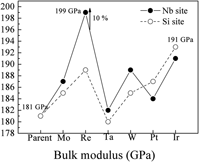Crossref Citations
This article has been cited by the following publications. This list is generated based on data provided by
Crossref.
Pan, Y.
and
Guan, W.M.
2018.
Exploring the structural stability and mechanical properties of TM5SiB2 ternary silicides.
Ceramics International,
Vol. 44,
Issue. 8,
p.
9893.
Pan, Yong
and
Wen, Ming
2018.
Insight into the oxidation mechanism of Nb3Si(111) surface: First-principles calculations.
Materials Research Bulletin,
Vol. 107,
Issue. ,
p.
484.
Pan, Yong
Wang, Shuanglun
Zhang, Xi
and
Jia, Linhu
2018.
First-principles investigation of new structure, mechanical and electronic properties of Mo-based silicides.
Ceramics International,
Vol. 44,
Issue. 2,
p.
1744.
Zhang, Rui
Gao, Peifeng
Wang, Xingzhe
and
Zhou, Youhe
2019.
Pressure and temperature dependence of structural and elastic properties of FeSe superconductor by first-principles calculation.
Cryogenics,
Vol. 102,
Issue. ,
p.
28.
Wu, Ying
Bao, Longke
Wang, Xinyu
Wang, Yong
Peng, Mingjun
and
Duan, Yonghua
2020.
Insight into structural, electronic, elastic and thermal properties of A15-type Nb3X (X = Si, Ge, Sn and Pb) compounds.
Materials Today Communications,
Vol. 25,
Issue. ,
p.
101410.
Wang, Weiyang
Xiao, Zhu
Lei, Qian
Meng, Hao
Guo, Qiuhua
Yang, Yihai
and
Li, Zhou
2021.
A multiphase strengthened Cu-Nb-Si alloy with high strength and high conductivity.
Materials Characterization,
Vol. 182,
Issue. ,
p.
111565.
Xu, Z.Q.
Ma, Z.L.
Tan, Y.
Wang, M.
Zhao, Y.
and
Cheng, X.W.
2022.
Effects of Si additions on microstructures and mechanical properties of VNbTiTaSi refractory high-entropy alloys.
Journal of Alloys and Compounds,
Vol. 900,
Issue. ,
p.
163517.
Pu, Delin
and
Pan, Yong
2022.
First‐principles investigation of solution mechanism of C in TM‐Si‐C matrix as the potential high‐temperature ceramics.
Journal of the American Ceramic Society,
Vol. 105,
Issue. 4,
p.
2858.
Pan, Yong
2022.
First-principles investigation of the effect of noble metals on the electronic and optical properties of GaN nitride.
Materials Science in Semiconductor Processing,
Vol. 151,
Issue. ,
p.
107051.
Hoc, Nguyen Quang
Dat, Hua Xuan
and
Thanh, Pham Trung
2023.
Thermodynamic and elastic properties of tungsten and tungsten silicide.
Modern Physics Letters B,
Vol. 37,
Issue. 09,
Terekhov, V.A.
Domashevskaya, E.P.
Kurganskii, S.I.
Nesterov, D.N.
Barkov, K.A.
Radina, V.R.
Velichko, K.E.
Zanin, I.E.
Sitnikov, A.V.
and
Agapov, B.L.
2023.
Formation of the Al3Si metastable phase in Al-Si films obtained by ion-beam sputtering according to experimental and theoretical data.
Thin Solid Films,
Vol. 772,
Issue. ,
p.
139816.
Falkowski, M.
Śniadecki, Z.
Bednarchuk, T. J.
and
Kowalczyk, A.
2023.
Structural and physical properties of the II-type superconductor Nb5Si2B.
Journal of Applied Physics,
Vol. 133,
Issue. 24,
p.
243901.
Pan, Yong
2023.
Effects of Cu, Ag and Au on electronic and optical properties of α-Ga2O3 oxide according to first-principles calculations.
Journal of Physics and Chemistry of Solids,
Vol. 174,
Issue. ,
p.
111152.
Yu, Ende
and
Pan, Yong
2023.
First-principles prediction of structural, electronic and optical properties of alkali metals AM4BN3H10 hydrides.
International Journal of Hydrogen Energy,
Vol. 48,
Issue. 39,
p.
14785.
Aslam, Ahmad Waqar
Rasul, M.N.
Hussain, Altaf
Rafiq, M.A.
Akbar, M.S.
Rehman, Jalil ur
and
Haseeb, Muhammad
2024.
First-principles investigation of physical properties of transition metal-based ternary TM5Si3C (TM = Nb, Mo, Ta, W) silicides of nowotny phase.
Journal of Physics and Chemistry of Solids,
Vol. 187,
Issue. ,
p.
111873.




